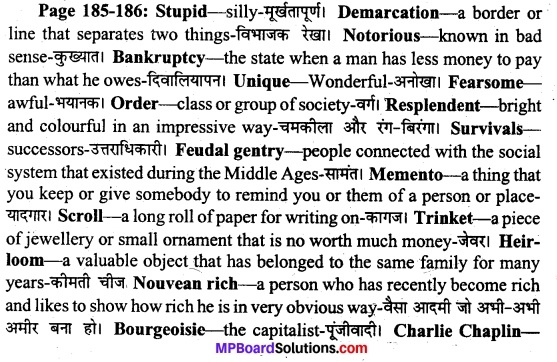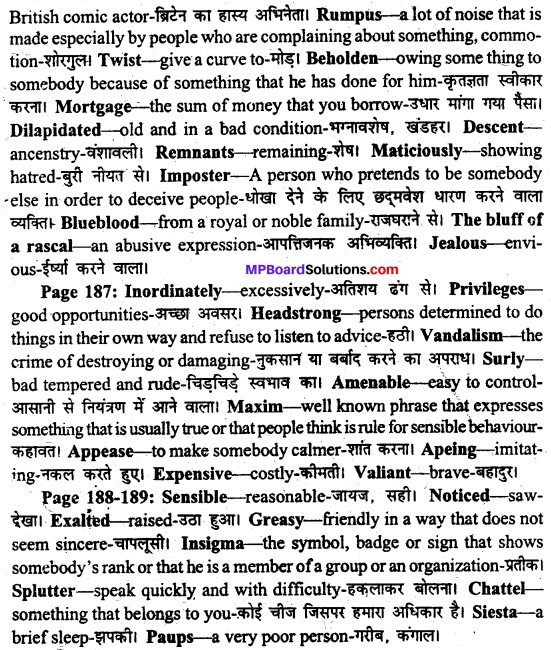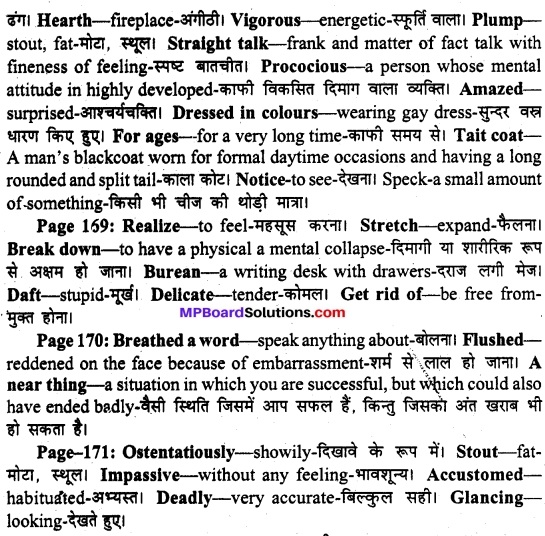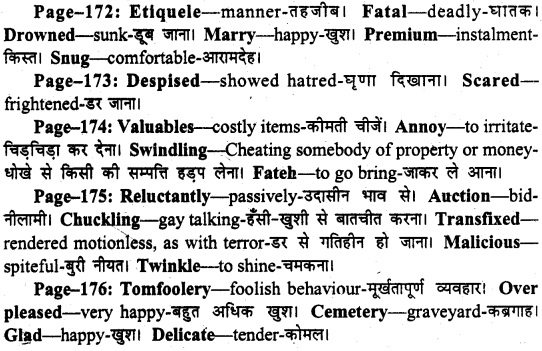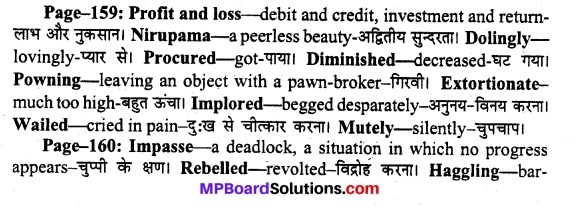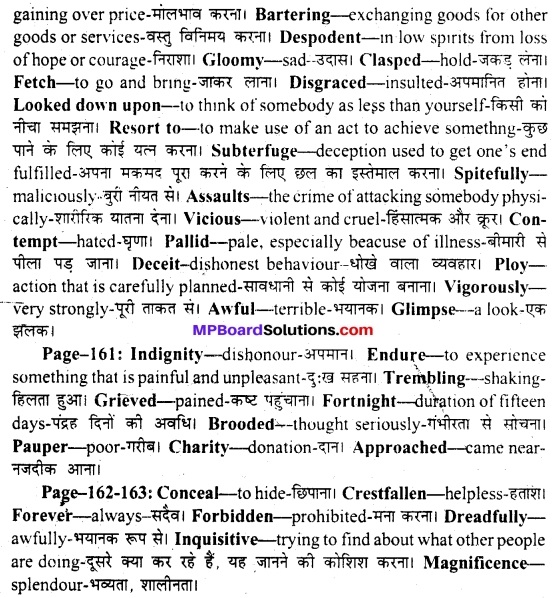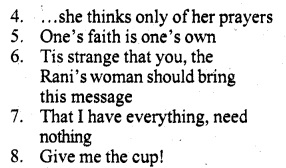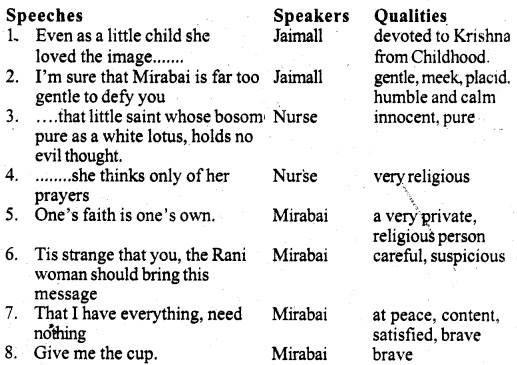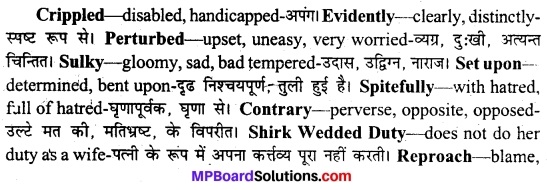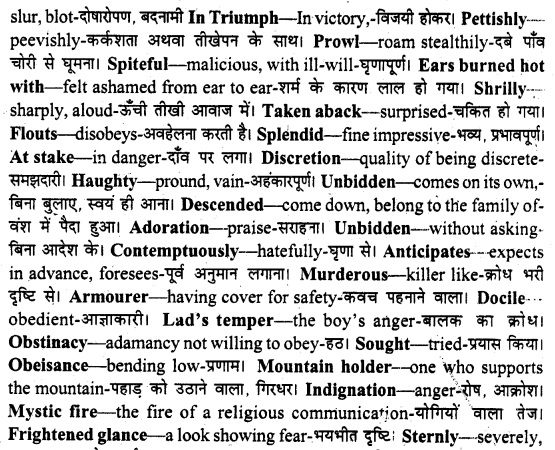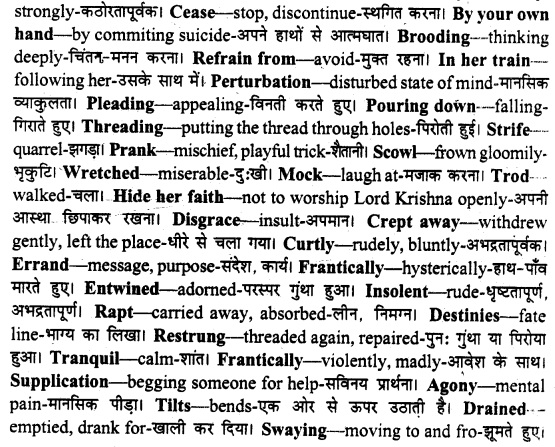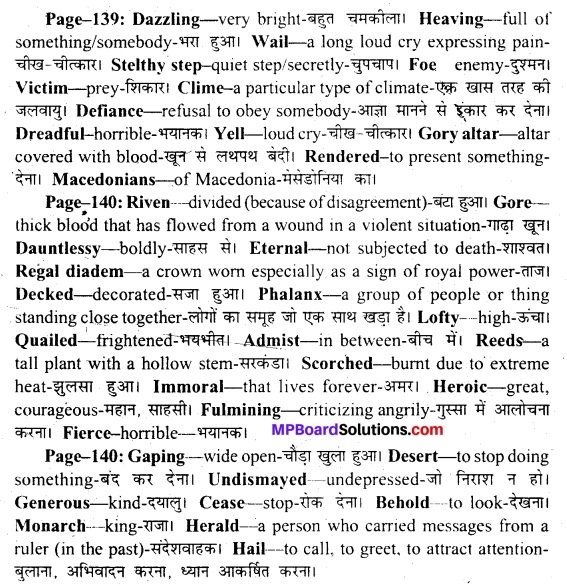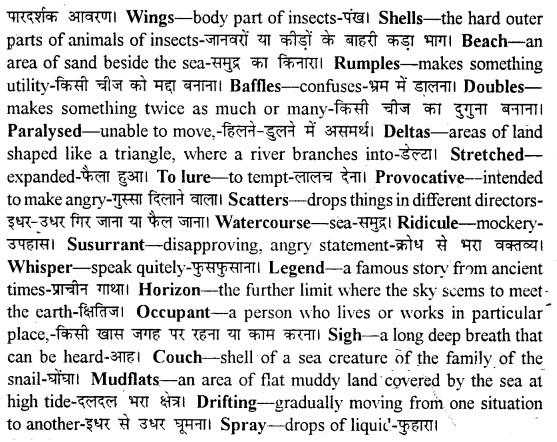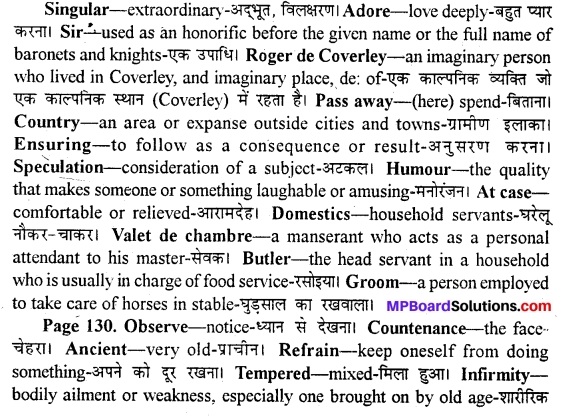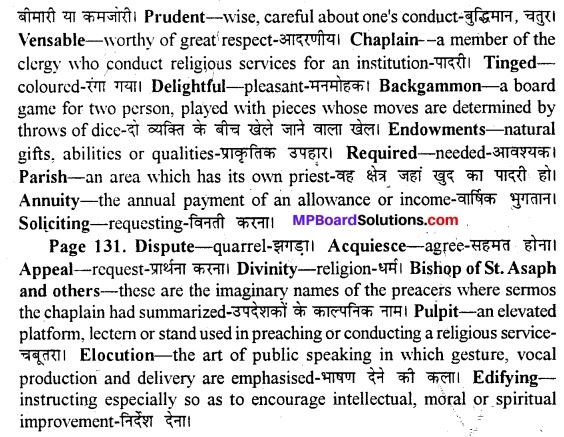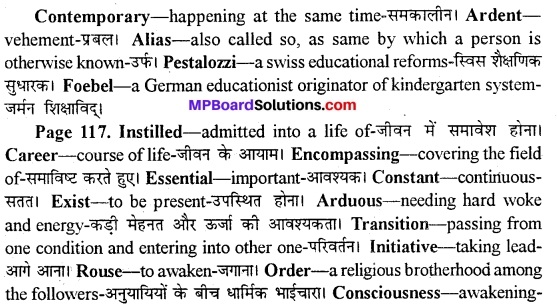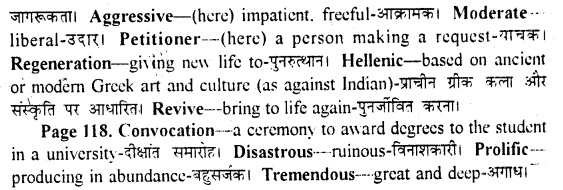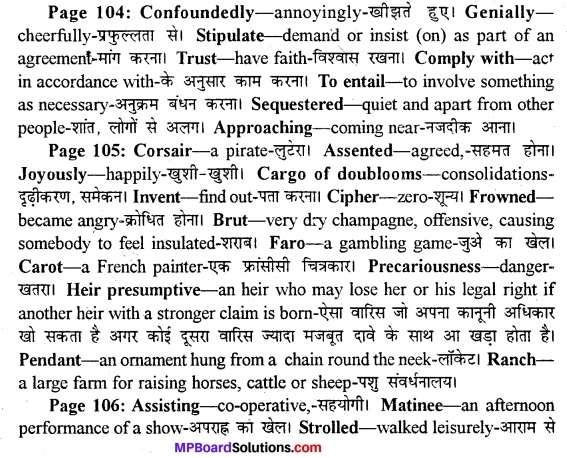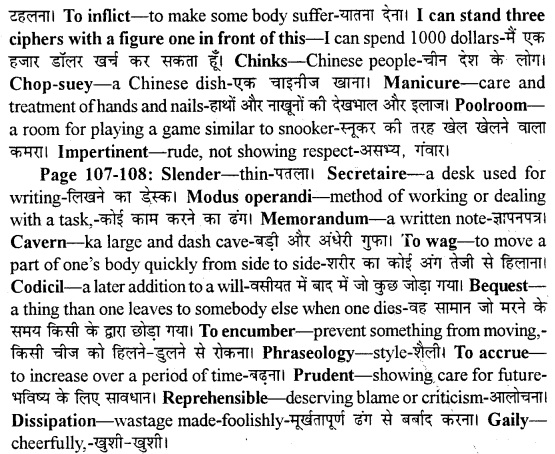Students who are studying 11th can get the free Madhya Pradesh Board Solutions for 11th English Chapter 23 The Bishop’s Candlesticks Questions and Answers PDF here. You can download MP Board Class 11th English Solutions Questions and Answers PDF on this page. Practice questions of Mp Board Solutions of 11th English subject as many times as possible to get good marks.
MP Board Class 11th English A Voyage Solutions Chapter 23 The Bishop’s Candlesticks (Norman Mckinnel)
Gather chapter wise MP Board Solutions for 11th English Study Material to score the highest marks in the final exam. Various chapters and subtopics are given clearly in MP Board Class 11th English Solutions Chapter 23 The Bishop’s Candlesticks Questions and Answers Material. All the MP Board Solutions for 11th English Questions with detailed answers are provided by subject experts. The step by step MP Board Class 11th English Chapter 23 The Bishop’s Candlesticks Questions and Answers guide will help you to enhance your skills in English subject and grammar. Here, along with the subject knowledge, grammar knowledge also plays an important role. So, students should download MP Board Solutions 11th English and read it to attempt all the questions with 100% confidence.
The Bishop’s Candlesticks Textual Exercises
Word Power
(A) Bishop is an ordained member of the Christian clergy who, in most churches holds a position of authority. Arrange the following in order of their authority:
Parson
Cardinal
Chaplain
Prelate
Pope
Arch Bishop
Answer:
- Pope
- Arch Bishop
- Cardinal
- Parson
- Prelate
- Chaplain
(B) Fill in the blanks choosing from those given below:
earnestly, incredulously, scoundrel, convict, benefactor.
1. The ……………. had been wronged by the society.
2. The Bishop ……………. desired to help the poor.
3. The convict shook his head ……………. at the Bishop’s kind behaviour.
4. Persome considered the convict a …………….
5. The Bishop ultimately proved to be the convict’s
Answer:
- convict
- earnestly
- incredulously
- scoundrel
- benefactor.
(C) Study the text to locate the antonyms of the given words: easy, human, open, reluctance, distress
Answer:
- easy – restless
- Human – beast
- Open – shut
- Reluctance – earnestness
- Distress – comfort
(D) Make sentences using the following words: estate, chatter, glare, track, convent
Answer:
- Estate – He was inherited a big estate from his father.
- Chatter – Do not chatter in class.
- Glare – The face of the priest glares with his virtues.
- Track -I always make an effort to follow a track of truth.
- Convent – Mother Teresa was a member of a convent.
Comprehension
Answer the following questions in 150 words each:
Question 1.
What role do the candlesticks play in the lives of the Bishop and the convict?
Answer:
Candlesticks play the most prominent role in the whole of the story especially in the lives of the Bishop and the convict. As the title of the play applies the candlestick belongs to the Bishop who got it from his dying mother. The mother had asked him to keep them in the remembrance of her. Bishop therefore had a great attachment with the candlestick.
He loves it more than his life and doesn’t want to part from it. He has generously donated all his belongings one by one for the welfare of someone or the other. But he is not reluctant to give the candlesticks to anyone. These candlesticks become also a turning point in the life of the convict who tempted to see them. He steals them when Bishop goes to sleep. The convict thinks that these candlesticks can change his life. He is so much tempted to them that he doesn’t even care for the hospitality and the teachings of the Bishop. He runs away taking them.
Incidentally he is caught by the police and again brought to the Bishop for identification. The Bishop recognises the candlesticks but says that he himself had given them to the convict. It brings a great change in the convict’s life. Thus, the candlesticks are equally important for the Bishop and the convict.
Question 2.
The convict says to the Bishop, “I was a man. Now I am not a man”. Why and how?
Answer:
The convict incidentally enters the house of the Bishop. He appears to be very restless. He had been running away from the police. He thought that the Bishop’s house was the safest place to hide. The Bishop thinks him to be just and ordinary man. He has no intention to hand him to the police. The convict is completely fed up with his life. He thinks himself to be dead. He says to the Bishop that once he was a man but now he is just number 15729 which he was given in the prison and had been called so for the last ten years. Before that he had a little cottage surrounded by vines growing on it. He, had a wife.
Once she was ill and they had no food. He was workless. His wife was dying. He stole for the first time to feed her. He was caught. None of his pleas was considered and he was put in jail for ten years. During those ten years he was in hell treated very badly even worse than beast. The hellish treatment ruined his life. He was chained like a wild animal and lashed like a hound. He was fed on filth and covered with vermins. There was no one to listen to his complain. So he says to them, that he was a man once but now, he was only a beast.
Question 3.
In the end the convict says, “You have made me feel that it is just as if something had come into me – as if I were a man again and not a wild beast.” What does it mean and how did this change come in the convict.
Answer:
The convict in the play ‘The Bishop and the Candle stick’ is a man who comes in the house of the Bishop. He had been in jail for ten years for no fault. As he says to the Bishop that he had a family but no job. His wife was ill and dying with starvation. He stole for the first time to feed his dying wife. But he was caught . None of his pleas was taken to notice and he was put in jail. He was treated like a beast in every sense of the term. However when he was released after a long hellish life by that time he was nothing more than a beast. The Bishop gives him shelter and treats him with sympathy.
He asks him to forget the past and to live a good life. But the convict is so fed up that he ignores Bishop’s preachings. He has no love for humanity. So he steals Bishop’s candlesticks. But he is caught. When the police come to the Bishop for recognition of the candlestick the Bishop says to them that the convict was his friend and he himself has given these candlesticks to him.This virtue of the Bishop transforms the convict’s mind. He realizes his mistake and admits that the Bishop had created something new in the convict’s life.
Question 4.
Discuss the character of the Bishop in the light of the following points:
(a) His family
(b) His love for the poor and the suffering.
(c) His charitable behaviour-an example of ‘charity begins at home’.
(d) His faith in rousing the goodness in a man.
(e) Overall assessment.
Answer:
Bishop is the most prominent character in the play ‘The Bishop’s Candlesticks’. The dramatist through his character conveys a high moral lesson to the reader. Bishop is a man of simple living. He lives with his only sister Persome. He has great affection for the poor and the suffering. He helps them in all his capacity. He is highly charitable. He has donated all his belongings to the poor. He never thinks for himself and for his family. His sister doesn’t like his charitable nature because he has donated everything to the needy. Even the last item the salt cellar is also donated to a person who needs to pay rents.
The last item in the house is a candlestick. Persome tells him that he would certainly give it to someone one day. But the Bishop promise to keep it forever in the memory of his mother. A convict comes in his house. He doesn’t hesitate to provide him with all comfort and care against the wish of Persome. Later he comes to know the convict’s story. But he allows him to remain in the house.
He preaches him also. The Bishop is not ready to take the convict to be a real criminal. Pie only thinks him to be a human being. Even when the convict runs away with the Bishop’s candlestick, and the police brings him for recognition he says that the convict is his friend. On the whole we can conclude that Bishop is really a god fearing highly religious man.
Question 5.
What is the massage conveyed by the play?
Answer:
‘The Bishop’s Candlesticks’ is an one-act play with a Christian story, Its main focus is on the transfonnation of a man through realisation. The Bishop is the main character who represents a true devotee of the Almighty God. He appears to be a real Christian character who has all faith in God. He helps mankind in all his capacity. He gives all his belongings to help the needy and the poor. He thinks that a thing which a just a show-piece in his house can feed a poor man. So, why should it not be given to him? In this way heioses his big estate and all his household items.
His realistic character at its height when we see the convict-episode. A convict gets shelter in his house. His sister Persome opposes his stay but the Bishop doesn’t take him to be a criminal. He thinks the criminal is just a human being and there is no harm in allowing him to stay with them. The convict does not conceal anything about himself. He has no feeling nor trust for God or for humanity. So he steals, the Bishop’s candlesticks and runs away. Incidentally he is caught by the police. He is brought to the Bishop for recognition of the candlesticks as they bear the name of the Bishop. The Bishop tells the police that the convict was his friend and the Bishop had
himself given the candlesticks to him. It makes the convict feel and realize the power of godly existence. He, completely transformed. The Bishop’s preaching work well and prove that no one is born criminal. Situation makes one so and if treated with compassion arid sympathy one can be put on the right path.
Question 6.
Suppose you are convict. Narrate the story of your life, based on the play, in first person.
Answer:
I am a convict. I had been under the 10 years imprisonment. I was convicted for none of serious crime. I had a family. I had no job. I was penniless. Suddenly my wife got ill seriously, she was ill of starvation. She was dying. I had nothing to feed her. For the first time I stole to feed her. But I was caught. Nobody considered or even listened to my pleas. I was put in jail where I was treated nothing more than a beast. I was chained like a wild beast. I was lashed like a hound. I fed on filth. It was nothing more than a hell. However, I got released after such a long spell of hellish life. But outside again there was starvation. By chance I saw a Bishop’s house. I thought it to be the safest place to live out of police’s sight.
I entered the house and terrorised the Bishop. Bishop was a nice gentleman. He didn’t react in any way. Though his sister was not only ready to let hie stay even for a second. But the Bishop allowed me to stay there. He tried for influence me in various ways. In his view I could be changed and turned to be a good man. As I had suffered such a lot that I couldn’t believe him. I didn’t even care for his hospitality. I stole his candlesticks. But I was caught by the police. The police took me to the Bishop. The Bishop was really a great soul. He told the police that I was his friend and he himself had given the candlesticks to me. I was released. It touched my soul and then I realized the existence of God. He had made me a man again. Now I am completely a changed man.
Question 7.
“There is so much suffering in the world and I can do so little”. What would you like to do to reduce suffering of mankind?
Answer:
This world is a wonderful creation of God. All through the life a man faces many ups and downs. It is said that we learn better from our sufferings. There are different kinds of sufferings that we face. It may be poor living condition, lack of resources, ailments, etc. Everyday, in our life we come across rag pickers, beggars in many forms. Those rag-pickers or beggars have no shelter or any other facility for their living. They can hardly live a life nothing better than a beast or animal.
We are pained to see them. They are sufferers and we too. Still there a hope which can change the whole scenario if we take it seriously.Sometimes I feel great pain to see them and I think to do something for them. First of all I’ll establish a charity home to provide food and shelter to the destitutes. I’ll also start a school for them. I’ll try to raise fund for them through charity shows. I’ll also get cooperation from the government.
Question 8.
“You have suffered much but there is hope for all.” Do you agree?
Answer:
This world is a wonderful creation of God. All through the life a man faces many ups and downs. It is said that we learn better from our sufferings. There are different kinds of sufferings that we face. It may be poor living condition, lack of resources, ailments, etc. Everyday, in our life we come across rag pickers, beggars in many forms. Those rag-pickers or beggars have no shelter or any other facility for their living. They can hardly live a life nothing better than a beast or animal.
Question 9.
“This poor is the Temple of the Living God”. Do you feel the presence of God inside you? How and when?
Answer:
The question of existence of God is very critical because till how no one has given any perfect answer to it. Right from the beginning there has been controversies over it. On the one hand while the old saints or religious books confirm the existence of God, while on the other hand scientists do not believe in it. It is because science believes in the thing which can be seen. But God has never been seen. .Still we can’t deny the saying that this poor body is the temple of the living god. There are some facts behind it. Sometimes we feel wouder if we think over the whole creature. But it is still a mystery why the dies and why he takes birth. Similarly, the blooming of flowers, greenery of plants, evolution of a man are some of the facts that which are beyond our understanding. Similarly, whenever we are in distress automatically we gain confidence if we go to a temple. So I feel there is God or some super-power that controls the whole creation.
Speaking Activity :
Make 5 groups of 2 students each and make theft speak the dialogues exchanged between the Bishop and the convict. One student should enact the Bishop and the Convict’s role should be enacted by another student.
Answer:
Attempt yourself.
Writing Activities
Write a paragraph in about 100 words on each of the following:
Question 1.
Criminals are not born but circumstances make them.
Answer:
Our society is a complex phenomenon. Different types of people enjoy their life in their own way. Some of them follow the norms of society which some other do not observe them. Those who do not observe and follow a set pattern of social life are called anti-social. They are also called criminals. They commit crimes. Crimes are those activities which are against laws.
In fact the persons who make attempts to commit crimes are the same as others living a normal life. Normally we see that criminals are misguided or diverted persons who are either put into those activities or circumstances make them so. There are several instances of it. Prominent examples can be given from the life of Phoolan Devi who turned to be a dacoit due to the ill-treatment of the society, of the upper classes. Later, when she was mobilized, she surrendered and also became a Member of Parliament. Hence, we can’t deny the role of circumstances in the making of a criminal.
Question 2.
At an appropriate moment a man is capable of undergoing change of heart.
Answer:
Our society is a complex phenomenon. Different types of people enjoy their life in their own way. Some of them follow the norms of society which some other do not observe them. Those who do not observe and follow a set pattern of social life are called anti-social. They are also called criminals. They commit crimes. Crimes are those activities which are against laws.
Question 3.
Memorable dramatic characters have a lasting impact upon the audience.
Answer:
Life is a long journey. In it we perform different roles. So, life is said to be, drama in which we all are actors. Life is a stage. Sometimes it happens that we feel much impressed with a character performing a particular role in a drama. There are various factors that make us impressed with a character. The first thing is the powerful performance of the character. Then there is the story which appears to be identical to our life. The realistic touches, delivery of dialogues are some of the other factors that put its lasting impression upon the audience.
Question 4.
Charity begins at home.
Answer:
‘Charity begins at home’ is a well-known old proverb. It signifies the generous character of a human being. Sometimes it is seen that a saintly character is so much generous that he doesn’t care for his family and his life. Man has been bestowed with many responsibilities. To bear those responsibilities is his prime concern. Negligence to any of these not good. It doesn’t mean that ope should not be generous. Instead one should first be generous foremens family and then to others. The fulfillment of the need of the family should be given priority. Otherwise it is a crime. One may be very popular in society with his generosity, nobility, kindness, caring etc. But if one doesn’t think for his liabilities, one cannot be admiral because he has ignored his prime concern. Even God will not praise him. So, it is true that charity begins at home.
Things to Do
Try to read the following three one-act plays, possessing a similar theme emphasizing the importance of kindness
(a) ‘Brother Wolf by L. Hausman’.
(b) ‘The Only Legend’ by Johh Drinkwater,
(c) ‘In Safety’ by Margaret Macnamara
Ans.
Do yourself.
The Bishop’s Candlesticks Summary in English
The play opens with the kitchen of the Bishop’s cottage. The kitchen is plainly but substantially furnished. As the play starts and curtain rises the audience find Persome and Marie in the kitchen Persome, the Bishop’s widowed sister is arguing with Marie, kitchen-maid of the house. It is 11 o’clock at night. The Bishop has gone out to attend upon Marie’s sick mother. Persome is very much worried about the whereabouts of her brother who is overstraining himself for the sake of die poor and needy. Marie tells her that the Bishop has sold his silver salt-cellars to help a poor woman pay her rent.
Persome gets angry on hearing this and begins to cry. Just then Bishop enters the cottage.He tells Mane, the maid to run home as her mother is feeling better. He is gives her his muffler as it is very cold outside. He prays for her and her mother. Marie leaves the cottage with gratitude. Persome gets angry with her brother for giving away all that he has. She remarks that one day he will also sell his candlesticks to help some needy. The Bishop says that he would like to keep diem because they were given to him by his dying mother.
The Bishop also laments that there in so much suffering in the world and be can ! do so little. Persome goes away to sleep and the Bishop sits down to read a book. Then there enters a convict with an open knife in his band. He is a convict who has run away from prison. He catches the Bishop from behind and demands food. The Bishop greets him with a tree smile. He feels true sympathy for him. He serves the convict with food and drink. When the convict has his fill, he starts telling the Bishop the story of his woe and suffering. He says that once he stole to buy food for his wife who had been starving to death. But he was arrested and in prisoned. The night he was sentenced his wife died. The prison life was a life of hell. His sufferings made him a hardened criminal. One day they forget to chain him up, so he escaped and starved till that day. They were searching for him everywhere.
The Bishop consoles the convict. He advised him to take rest for some time. He makes for him a bed to lay down. The Bishop leaves the room leaving the convict all alone. His eyes catch the sight of silver candlesticks on the mantelpiece. He thinks of stealing them away to lead a new better life for some time. There is a struggle in his mind. He does feel for the Bishop who has been so kind to him but then he hardens himself. He hides the candlesticks in his coat and runs off cautiously.
As the convict moves out Persome wakes up and hears the noise of slamming the door and raises alarm. She comes running and finds that the convict has run away with the candlesticks. She calls the Bishop and asked the Bishop to inform the police but the Bishop does not want. He consoles himself and says: ‘He has more need of them than I. He refuses to take any action against the convict. He can’t think of sending him back in jail to suffer any more.
Just then a sergeant enters the cottage with three policemen with convict and stolen candlesticks. He tells the Bishop that they found him slinking suspiciously. On searching him, the candlesticks fell out of his pockets. As he remembered the candlesticks of the Bishop, he brought him here. He asks the Bishop if those are his candlesticks. The Bishop tells the sergeant that the man is his very good friend, and he has himself given him the candlesticks. At this the sergeant frees the convict and goes away with his men.
This last stroke of sympathetic behaviour of the Bishop shakes the convict to boot. He begs pardon of the Bishop and feels sorry for what he has done. It brings tears in his eyes. He seeks die Bishop’s permission to go to Paris and to start noble life there. When he turns to go die Bishop gives him the candlesticks. He also tells him of a lonely path through the forest by which he can escape. The convict stands with his head, bowed before the Bishop. The Bishop puts his hand lovingly on his shoulder. The Bishop asks him to remember that the poor body is die Temple of the Living God. After the convict walks out, the Bishop goes down on his knees in prayer.
The Bishop’s Candlesticks Summary in Hindi
नाटक का प्रारंभ बिशप के घर में रसोईघर के दृश्य से होता है। रसोईघर बहुत सामान्य किन्तु व्यवस्थित है। जैसे ही नाटक प्रारम्भ होता है और पर्दा उठता है दर्शक परसम तथा मैरी को एक पादरी के कॉटेज की रसोई में पाते हैं। परसम पादरी की विधवा बहन है जो घरेलू नौकरानी मैरी से तर्क कर रही है। रात के 11 बजे हैं। विशप मैरी की बीमार माँ को देखने बाहर गए हुए हैं। परसम अपने भाई के प्रति काफी चिन्तित है, जो स्वयं को गरीब तथा जरूरतमंदों के लिए अधिक थका रहे हैं। मैरी उसे बताती है कि विशप ने अपने चाँदी के नमकदान बेच दिए हैं ताकि वृद्ध महिला का किराया चुकाया जा सके। परसम यह सुनकर बहुत क्रोधित हो जाती है तथा चीखने लगती है। तभी बिशप कॉटेज में प्रवेश करते हैं।
वह मैरी को बताते हैं कि अब वह घर चली जाए क्योंकि उसकी माँ अब अच्छा अनुभव कर रही है। वह उसे अपना ऊनी मफलर भी दे देते हैं क्योंकि बाहर काफी सर्दी है। वह उसके तथा उसकी माँ के लिए प्रभु से प्रार्थना भी करते हैं। मैरी आभार सहित कॉटेज से चली जाती है। परसम आने भाई पर बहुत क्रोधित होती है क्योंकि वह अपनी प्रत्येक वस्तु किसी न किसी को दे रहा है। वह कहती है कि एक दिन वह अपनी मोमबत्ती दान भी बेच देगा ताकि किसी जरूरतमंद की सहायता की जा सके। विशप उस पर कहते हैं कि वह उन्हें सहेजकर रखना चाहते हैं क्योंकि वे उनकी माँ ने मरते समय उसे दिए थे। विशप यह भी कहता है कि दुनिया में बहुत संकट है और इन संकटों से मुक्ति के लिए कुछ करना चाहते हैं।
परसम सोने चली जाती है और बिशप पुस्तक पढ्ने बैठ जाते हैं। तभी एक अपराधी जिसके हाथ में एक लम्बा चाकू है, कमरे में चोरी के उद्देश्य से प्रवेश करता है। वह एक अपराधी है जो जेल से भागा हुआ है। वह बिशप को पीछे से पकड़ता है और खाना माँगता है। विशप उसका मुस्कान से स्वागत करता है। उसे उसके लिए सच्ची संवेदना अनुभव होती है। वह अपराधी को भोजन तथा शराब प्रदान करता है। जब अपराधी पेट भरकर खा चुकता है, तब वह अपनी दुःख भरी कथा बिशप को सुनाना प्रारंभ करता है। वह कहता है कि एक बार उसने अपनी भूख से मरती पत्नी के लिए भोजन चुराया था। उसे वहाँ पकड़ लिया गया और जेल भेज दिया गया। जिस दिन उसे सजा सुनाई गई, उसकी पत्नी मर गई थी। जेल का जीवन उसके लिए नरक का जीवन था। उसके दुखों ने उसे एक दुर्दात अपराधी बना दिया था। एक दिन वे उसे हथकड़ियाँ तथा बेड़ियाँ पहनाना भूल गए थे, इसलिए वह भाग निकला और आज तक भूखा फिर रहा है। वे उसे हर जगह तलाश कर रहे हैं।
विशप अपराधी को सांत्वना देता है। वह उसे कुछ देर आराम करने की सलाह देता है। वह उसके लेटने के लिए बिस्तर लगाता है। बिशप अपराधी को कमरे में अकेला छोड़ कर चला जाता है। अपराधी की नजरें अंगीठी पर पड़े मोमबत्तीदान पर पड़ती हैं। वह उन्हेंचुराने की सोचता है ताकि कुछ समय के लिए वह नया जीवन जी सके। उसके मस्तिष्क में संघर्ष चलता है। वह बिशप के लिए अनुभव करता है कि विशप उसके प्रति काफी दयालु रहा है, किन्तु तब वह अपने आपको कठोर बना लेता है। वह अपने कोट में मोमबत्तीदान छुपा लेता है और सावधानी से चला जाता है।
जैसे ही अपराधी बाहर जाता है, परसम जाग जाती है और दरवाजा बन्द होने का शोर सुनकर चिल्ला उठती है। वह बाहर भागते हुए आती है और पाती है कि अपराधी मोमबत्ती-दानों के साथ भाग गया है। वह बिशप को पुकारती है और कहती है कि वह पुलिस को सूचित करे किन्तु बिशप ऐसा नहीं चाहता। शीघ्र ही वह अपने आपको दिलासा देता है ! उसकी आवश्यकता मेरी आवश्यकता से अधिक होगी। किन्तु वह अपराधी के प्रति कोई कार्यवाही करने से इंकार कर देता है। वह अपराधी को और अधिक कष्ट उठाने के लिए पुनः जेल नहीं भेजना चाहता।
तभी सार्जेन्र कॉटेज में तीन पुलिस वालों और अपराधी के साथ प्रवेश करता है जिसके पास चुराए गए मोमबत्तीदान हैं वह बिशप से कहता है कि उसने उस (चोर को) सन्देहास्पद स्थिति में पकड़ा है। उसकी तलाश लेने पर मोमबत्तीदान उसकी जेब से गिर पड़ा वह उन मोमबत्तीदान के बारे में बिशप से पूछता है। विशप पादरी की बताता है कि यह व्यक्ति उसका घनिष्ठ मित्र है, और उसने स्वयं ही ये मोमबत्तीदान उसे दिए हैं। इस पर सार्जेन्ट अपराधी को छोड़ देता है और अपने सिपाहियों के साथ वापिस चला जाता है। बिशप के सहानुभूतिपूर्ण व्यवहार का यह अन्तिम झटका अपराधी को झकझोरकर रख देता है। वह विशप से आज्ञा माँगता है और अपने किए पर खेद प्रकट करता है।
उसकी आंखों में आंसू आ जाते हैं वह पेरिस जाने के लिए विशप से आज्ञा माँगता है ताकि वहाँ पर नई जिंदगी शुरू कर सके। जब वह जाने के लिए मुड़ता है, तो विशप उसे मोमबत्तीदान भी दे देता है। वह उसे एक सुनसान रास्ता भी बताता है जो जंगल से होकर गुजरता है और उसके लिए सुरक्षित है। अपराधी अपना सिर नीचे किए बिशप के सामने झुका खड़ा रहता है। बिशप अपना हाथ स्नेहपूर्वक उसके कंधे पर रखता है और उसे याद रखने के लिए कहता है कि यह शरीर सजीव ईश्वर का मंदिर है। जैसे ही अपराधी चला जाता है. बिशप अपने घुटनों के बल बैठकर प्रार्थना करने लगते हैं।
The Bishop’s Candlesticks Word Meanings
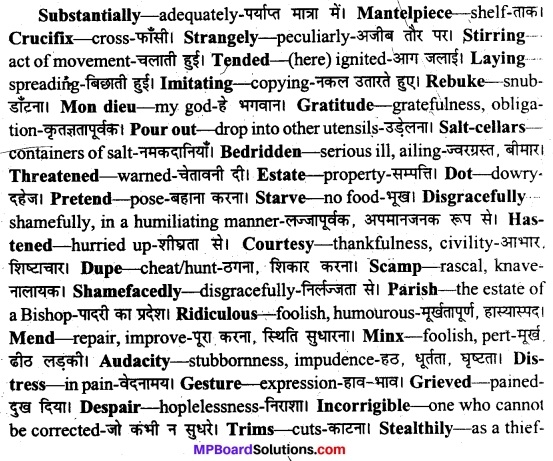
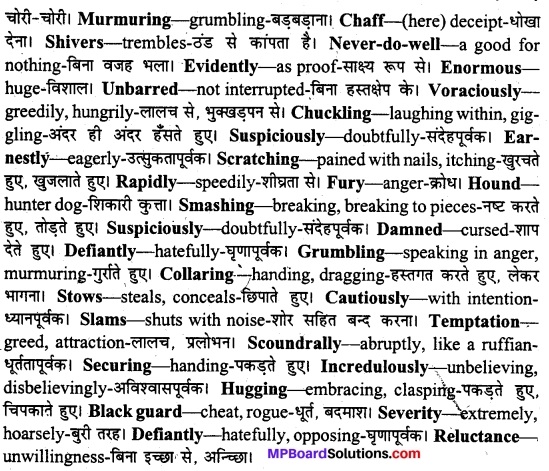
Above provided complete MP Board Solutions 11th English Study guide is useful for making your preparation effective. Students can frequently visit our page to get the latest updates on other subjects study materials.
